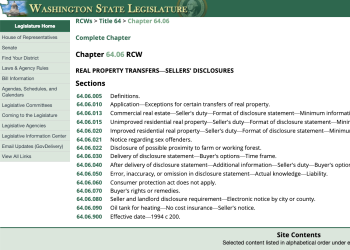There’s a new Washington Supreme Court case that changes the way buyers and sellers will negotiate. The case is Alejandre v. Bull. This case addresses the hottest issue right now in the State of Washington for Realtors, buyers and sellers. It involves the issue of unintentional misrepresentation by a seller and what remedy a buyer will have. This is especially hot, because the brand new Northwest Multiple Listing Service (NWMLS) Form 21, which is the Purchase and Sale Agreement used in almost all of Washington effective October 15, 2007, includes a check mark to include or not include a remedy for the buyer to sue the seller for unintentional misrepresentation.
The actual language is, “Disclosures in Form 17: Buyer will ___; will not ___ have a remedy for Seller’s negligent errors, inaccuracies, or omissions in Form 17.” Form 17 is Washington’s Seller Disclosure Statement.
Some have mistaken what this is all about, which is indicated by a response you will hear today by many in and out of the real estate business, “Well, seller’s should not be allowed to lie.” Another response is, “If the seller isn’t lying, what’s the problem?” That’s NOT what this is about. Those kinds of statements miss the whole point. Of course, seller’s should not lie. If the Alejandre case and the new language in the Form 21 was just about catching liars, we would all be rejoicing.
This issue casts a very large net, and will capture honest and completely innocent sellers who never lied and had no way of knowing about a hidden defect or problem inside their septic, or inside a wall, or under their foundation, and so on. You get the point. But this new language gives them the right to sue, and maybe win a huge judgment against an honest and completely innocent seller.
This ought to be a happy negotiating item between buyers and sellers, thank you very much lawyers and the NWMLS. (I’m a retired real estate attorney, but I would not have included this new remedy in Form 21.) There is a lot of misunderstanding and confusion about what this case means and how to handle the new Purchase and Sale Agreement. Realtors are challenged on how to explain this new option to buyers and to sellers.
Now a seller has to agree in writing with a buyer that he can be sued not only for breach of contract, but also “in tort” for unintentional misrepresentation. A seller may not actually have been in side his septic tank, and he may not actually know if there is a latent defect. Now, if the seller agrees to allow the buyer to sue him for any defects, even those he didn’t know about in his septic system (or elsewhere), he can be taken to court and everyone can pay the attorney’s $30,000 to $70,000. What fun!
My guess is that sellers will NOT agree to this (why would they?), so we will simply go back to the contract without this additional remedy for the buyer. The other amazing consequence of all this (as if it wasn’t predictable) is that sellers are going to make sure they don’t commit themselves to a “yes” or “no” on the Form 17 Seller’s Disclosure Statement if there is any possibility they may be sued. The safe answer may simply be an innocent “Don’t Know,” which oddly enough will actually help a seller from being held liable for misrepresentation. How’s that for gutting the State Legislature’s intent in creating the disclosure law?
Here’s my prediction:
- Sellers will fudge on Form 17 statements, marking “Don’t Know” whenever they can to protect themselves; or
- Sellers will simply require the buyer to waive the Form 17 or they won’t sell the property to that buyer ; or
- Sellers will not agree to a buyer’s demand to check line 9 on the P&S giving the buyer the right to sue for unintentional misrepresentation; or
- Sellers will do both 1 and 3 above.
How’s that for consumer protection! You’ve got to hand it to the lawyers and the NWMLS for destroying consumer protection in such a creative way. On top of that, they have confused the heck out of Realtors, buyers and sellers, and everyone in between. Even the lawyers across the state are in a frenzy writing each other legal memorandums, politely calling each other names.
Who has the toughest job in all of this? I’ll tell you who. The Realtor. How does a Realtor explain any of this to his buyer or to his seller? May I wish all you Realtors good luck in coming up with a script that will keep you out of jail. (Oops! I am a Realtor! Eghad!)
Last Updated on September 1, 2019 by Chuck Marunde




























